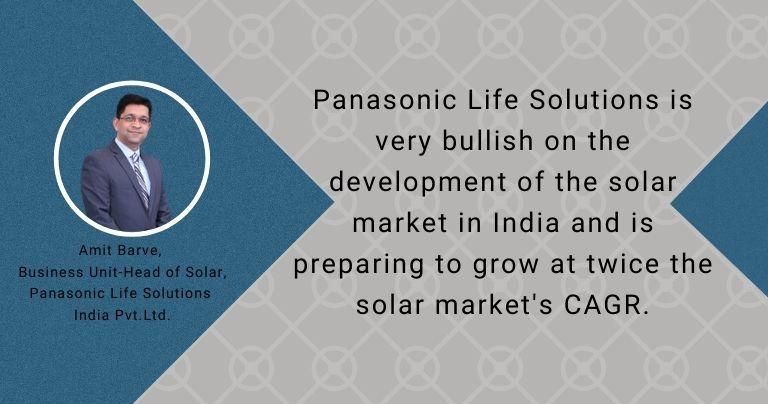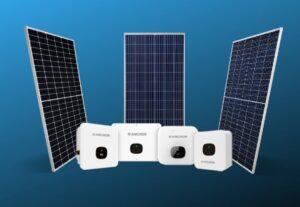Solar installations will continue to dominate the energy mix in power generation
By EPR Magazine Editorial December 23, 2021 3:34 pm IST
By EPR Magazine Editorial December 23, 2021 3:34 pm IST

Amit Barve, Business Unit – Head of Solar at Panasonic Life Solutions India Pvt.Ltd., in an interview with EPR Magazine.
India has a domestic manufacturing capacity of only 3 (GW) for solar cells and 15GW for solar modules. How can the solar companies take this opportunity to promote solar business in India?
India is growing by leaps and bounds in the solar energy space. The estimated growth considering moderate but consistent growth in this sector would lead India to be the world’s third-largest installed base for solar energy with a volume of 80 GW. With the current capacity of manufacturing, we are falling short of satisfying our existing demand. There is a further growing demand for imported solar modules as well as raw materials like solar cells for making these solar modules.
For our existing stakeholders in manufacturing, as well as others wishing to enter this sector, taking the lead and expanding current capacities will be a great opportunity, or even setting up manufacturing hubs for solar. There is no dearth in demand and there are also excellent government policies for the consumption of solar energy as well as for setting up manufacturing in the value chain, including the Production Linked Incentives (PLI) scheme.
How are the global solar pricing and tariff trends impacting the quality deliverables?
Global solar power pricing has affected developers and slowed down project installations due to a surge in costs. The world economy has also been affected due to the pandemic, and as a result, the supply chain has also borne the brunt. The surge in costs for components, labor, and freight suggests the slower growth of the solar energy industry. This has also affected the Indian market for solar deliverables. However, we foresee solar installations worldwide continuing to rule the energy mix in newly added power generation capacity y-o-y for the coming years. As countries are becoming more aware of fighting climate change and working towards reducing carbon emissions, the demand for solar energy will continue to grow steadily.
There are new technologies in the solar space that are being integrated to match the growing demand. But due to the pandemic, supply and demand have been unbalanced, and thus pricing would be higher in India as well for solar modules. The availability of quality solar modules has improved since the last quarter and should continue to grow in 2022 as well. Solar pricing has affected both demand and supply, but seeing the new technology and growing awareness in this space, quality can be rest assured. The prices of solar modules, however, will remain high due to increased costs for raw materials and shipping.
What kind of government policies, regulations and investments are required to enhance the position of Solar EPC in India?
Schemes like BCD, BIS, and ALMM will help in strengthening the local manufacturing efforts in India and will further encourage domestic producers of solar cells and modules for government projects. For example, the DCR scheme ensures the stakeholders use solar modules and cells made in India. However, this is restricted to government projects and is not a criterion for private players.

What kind of products and services do you offer in this segment?
The solar business has been an integral part of Panasonic Life Solutions India Private Limited (PLSIND) since the year 2015. We initially started our solar business in India for the distribution of imported solar modules (HIT). Over time, we started building our capability related to system business to deliver full turnkey solutions for setting up solar power projects. Till date, we have worked with multiple high-profile customers in India and have already completed the installation of over 85+ MWp. We are among the only Japanese solar EPC service providers in India as well as the only international solar module manufacturer with local manufacturing capability.
On the product side, over and above HIT modules, we also introduced Poly and MONO solar modules to the Indian market, followed up recently by even launching the “Made in India” offering and in DCR variant too. Going forward, we are expanding our distribution network across the country and are in the process of adding multiple solar-based products to augment the strength of our channels. We are now also starting exports of these solar modules to European countries as well as ASEAN countries.
Apart from our business of solar units, PLSIND also believes in sustainability as one of its core philosophies, and we have been installing rooftop solar plants at our various manufacturing units in India.
In the solar business, we would continue to expand our business in two broad areas: expanding our footprint in offering solutions to C&I customers for behind-the-meter projects; adding the possibility of offering locally made high-class solar modules over and above our imported offerings; and continuing building the product business by expanding the range of solar modules from Poly to Mono PERC and high wattage options through half-cut Mono Cells. We are also expanding our product line beyond modules to other solar products like string inverters, street lights, and DIY residential kits. All these products would be launched with Panasonic’s assured quality and service.
What is Panasonic’s outlook on the solar market for the next five years?
At Panasonic Life Solutions, we are very bullish on the solar market’s development in India and are preparing ourselves to grow at double the CAGR of that solar market’s growth in India. To execute this vision, we are not only expanding our product portfolio but also enhancing our service offerings beyond EPC and adding value-added services. We are also actively spreading our reach internationally by distributing our products worldwide. In the future, we also plan to offer services related to solar installation both at national and international locations.
We use cookies to personalize your experience. By continuing to visit this website you agree to our Terms & Conditions, Privacy Policy and Cookie Policy.